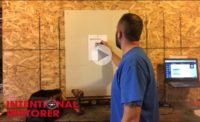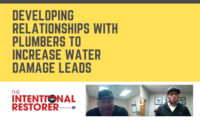The Intentional Restorer
Developing an Actionable, Effective Disaster Response Plan | with Video!
COVID-19 is exposing holes in the supply chain and companies' ability to adapt to local, regional and worldwide situations which affect health and commerce. It’s never too late to improve these systems.
Through various professional circles, Edward Colson and myself have interacted remotely over the years. We had discussed at some length emergency planning and continuity resources for business owners, facilities professionals and risk managers for a networking group that I directed called Local Facilities Managers Connection (LFMC). Following a career working with emergency preparedness within the healthcare sector Edward started Ready Northwest in 2016 to assist a broader audience in developing resiliency.
Our goal for this ongoing segment, Three Questions with A Pro, is to help gather pieces of the COVID-19 puzzle and share those with our peers in the restoration industry. Through The Intentional Restorer, I have been reaching out to a broad range of professionals within the various relevant fields to learn from their areas of specialty so that we can continue to work together to form common sense solutions. Please view the accompanying video of our interview with Edward Colson of Ready Northwest to hear all that Edward has to share on these topics.
Pandemics demonstrate why emergency management planning is important
We had issues prior to the outbreak of novel coronavirus. In the Pacific Northwest many of those engaging in the discussions around emergency management were focused on a Cascadia earthquake event and/or the potential for volcanic activity. Across the nation, many businesses were discussing measures for addressing active shooter situations. Edward shares that there are direct threats and hazards, like those listed above as well as indirect hazards. We are seeing this play out as this pandemic and consumer behavior strains our supply chains.
Prior to March of 2020, we all took toilet paper, tyvek suits and N95 respirators for granted, now they are treasures. Smart people have been warning for some time about the weaknesses in our supply chain systems as well as our reliance on overseas manufacturing. COVID-19 is forcing us to address the consequences of our lack of action and collaborate to find solutions.
Mr. Colson talks about three categories of threats:
- Natural disasters
- Man-made (anthropogenic) hazards
- Technological catastrophes
Ready Northwest has been working before, and now during, coronavirus to help companies, “Mitigate against, respond, and recover from disasters posed from natural, technological, and man-made hazards.” These are services that pair well with what many property restoration companies do to assist their clients to recover from disasters. Many restoration professionals assist with aspects of emergency management and disaster preparedness and are now engaging in services related to coronavirus response.
Edward’s observations as coronavirus raises new questions about preparedness
Unfortunately, many businesses and municipalities are learning just how remiss their resiliency preparedness plans were. We find ourselves scrambling in many areas to play from behind as we address the SARS-CoV-2 outbreak. Edward reminds people in a position of leadership to ensure that they get good information from reliable sources before they make decisions based upon unverified outlets. Responding to an outbreak with bad information and haphazard systems will only make our situation worse.
The wrong information can lead to unintended consequences for business owners, employees and local communities. “Be careful of what you share on social media, interviews, and media release. Trust and verify that the information you are releasing is accurate and from a trustworthy source.” Edward notes that It is also important to look at the information within the appropriate context.
What are some considerations for property restoration contractors responding to COVID-19?
Ready Northwest has created a Pandemic Planning Guide which includes the following recommendations for collaboration within your team as well as input that may be helpful to clients:
- Forming a Pandemic Response Committee to provide company updates in regards to policy, procedures, and reporting criteria.
- Utilizing Human Resources to report on sick leave policies and projected health and wellness impacts.
- Utilizing Legal Counsel to discuss impacts to operational quarantines and isolation. In addition, legal should review current contracts in place to determine any breach of clauses due to coronavirus impacts.
- Utilizing Marketing and PR to discuss impacts being seen regarding company reputation and crisis communication.
- Utilizing Procurement and Supply Chain Management to identify any critical delays in receiving and ordering products from areas impacted by the coronavirus.
As was shared in our prior interview with David Princeton in our prior Three Questions with a Pro as well as other voices of reason within R&R, Edward reminds business leaders to consider all of the factors prior to making decisions about how your company will respond to SARS-CoV-2. To those who are responding and keeping their operations open, Edward reminds everyone to take time to take care of themselves.
COVID-19 is exposing holes in the supply chain and companies' ability to adapt to local, regional and worldwide situations which affect health and commerce. It’s never too late to improve these systems. Ready Northwest provides companies large and small with emergency preparedness planning as well as testing of capabilities. Edward’s team will walk a company through scenarios to assist them with exposing holes and gaps so that they can be more resilient when threats from natural, man-made or technological sources occur.
- See also Edwards’s workbook Coronavirus (COVID-19) Pandemic Planning Guide
- Check out our prior interview with David Princeton of Advocate Claim Service for Three Questions with a Pro
Thank you for reading The Intentional Restorer’s segment Three Questions with a Pro, brought to you in collaboration with Restoration and Remediation (R&R) Magazine and The DYOJO. Take care of yourselves and be kind to each other #wegotthis #MTWSL
Looking for a reprint of this article?
From high-res PDFs to custom plaques, order your copy today!






